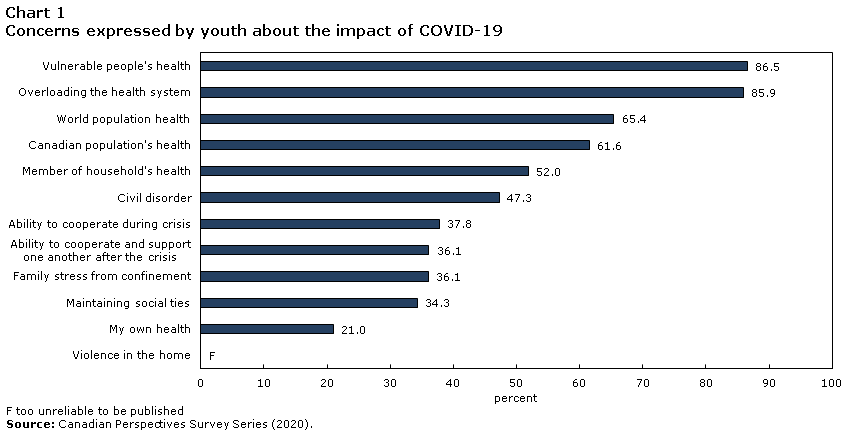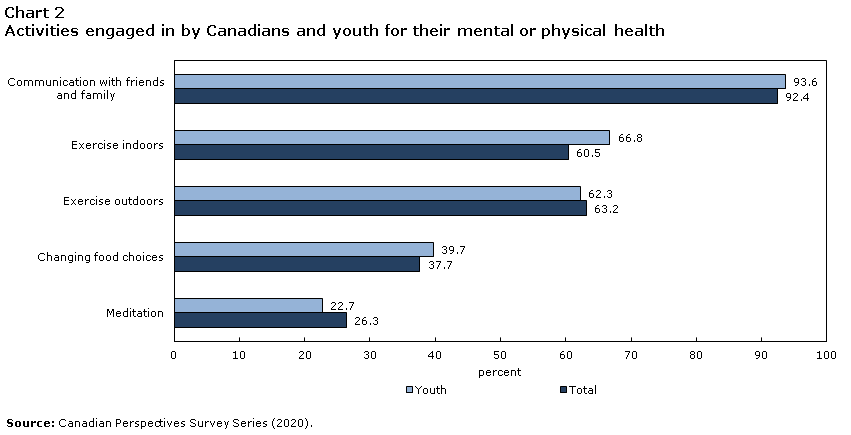 StatCan COVID-19: Data to Insights for a Better CanadaThe Health and Behavioural Impacts of COVID-19 on Youth: Results from the Canadian Perspectives Survey Series 1
StatCan COVID-19: Data to Insights for a Better CanadaThe Health and Behavioural Impacts of COVID-19 on Youth: Results from the Canadian Perspectives Survey Series 1
by Rubab Arim, Leanne Findlay and Dafna Kohen
The COVID-19 pandemic has profoundly affected the daily lives of all Canadians. However, relatively little is known about how the health, behaviour, and social activities of Canadian youth are affected and how they are coping with the situation. Canada’s youth represent about one quarter of the country’s population and will continue to be a large and important group within the Canadian population (Statistics Canada, 2019). Furthermore, youth are more likely to be at risk for poor mental health both prior to and during the COVID-19 pandemic (Findlay, 2017; Findlay & Arim, 2020).
Youth are more concerned about the health of others than about their own health
Youth were asked how concerned they were about different health, social, and family-related situations in the context of COVID-19. Results show that about 87% of youth aged 15 to 30 years are very or extremely concerned about the impact of COVID-19 on the health of vulnerable people. In addition, about 86% are very or extremely concerned that COVID-19 would overload the health care system. In contrast, about 21% of youth are very or extremely concerned about their own health. A similar pattern of concerns was previously reported for the Canadian population (Statistics Canada, 2020).
Furthermore, under half of youth aged 15 to 30 years are very or extremely concerned about the possibility of civil unrest, about 36% are very or extremely concerned about family stress from confinement, and about 34% are very or extremely concerned about maintaining social ties. These results are largely similar between male and female youth with one exception: females are more likely to be very or extremely concerned about the ability to cooperate during the crisis than males (44% vs. 30%).

Data table for Chart 1
| percent | |
|---|---|
| Vulnerable people's health | 86.5 |
| Overloading the health system | 85.9 |
| World population health | 65.4 |
| Canadian population's health | 61.6 |
| Member of household's health | 52.0 |
| Civil disorder | 47.3 |
| Ability to cooperate during crisis | 37.8 |
| Ability to cooperate and support one another after the crisis | 36.1 |
| Family stress from confinement | 36.1 |
| Maintaining social ties | 34.3 |
| My own health | 21.0 |
| Violence in the home | Note F: too unreliable to be published |
|
F too unreliable to be published Source: Canadian Perspectives Survey Series (2020) |
|
The majority of youth engage in positive health behaviours such as communication with friends and family and exercise
Youth were asked about the activities they engage in for their mental or physical health in the face of COVID-19. About 9 in 10 youth communicate with their friends and family, just over two thirds exercise indoors, and 62% exercise outdoors. A similar trend in the positive health behaviours were also observed for the Canadian population. Two notable differences were observed between male and female youth: females compared to males are more likely to communicate with their friends and family (97% vs. 90%) and to exercise indoors (73% vs. 59%).

Data table for Chart 2
| Youth | Total | |
|---|---|---|
| percent | ||
| Communication with friends and family | 93.6 | 92.4 |
| Exercise indoors | 66.8 | 60.5 |
| Exercise outdoors | 62.3 | 63.2 |
| Changing food choices | 39.7 | 37.7 |
| Meditation | 22.7 | 26.3 |
| Source: Canadian Perspectives Survey Series (2020). | ||
Methodology
Statistics Canada developed a new web panel survey to get timely information about how Canadians are coping with COVID-19. More than 4,600 people in the 10 provinces responded to this survey between March 29 and April 3. About 22% of the respondents were youth aged 15 to 30 years old. This release focuses on the most pressing concerns expressed by Canadian youth in that age group regarding the impact of COVID-19 and the kinds of activities they engage in for their mental or physical health.
Overall, the results indicate that youth are more concerned about the health of others than about their own health and they also engage in some positive health behaviours.
References
Findlay, L. (2017). Depression and suicidal ideation among Canadians aged 15 to 24. Catalogue no. 82-003-X. Ottawa, Ontario: Minister of Industry.
Findlay, L., & Arim, R. (2020). Canadians report lower self-perceived mental health during the COIVD-19 pandemic. Catalogue no. 45-28-0001. Ottawa, Ontario: Minister of Industry.
Statistics Canada (2019). A portrait of Canadian youth. Catalogue no. 11-631-X. Ottawa, Ontario: Minister of Industry.
Statistics Canada (2020). Canadian Perspectives Survey Series 1: Impacts of COVID-19. Component of Statistics Canada catalogue no. 11-001-X. Ottawa, Ontario: Minister of Industry.
- Date modified: